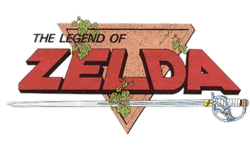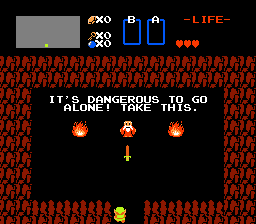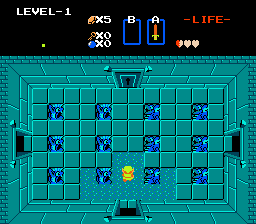|
|

|
PLATFORM
|
NES
|
BATTLE SYSTEM
|

|
INTERACTION
|

|
ORIGINALITY
|

|
STORY
|

|
MUSIC & SOUND
|

|
VISUALS
|

|
CHALLENGE
|
Very Hard
|
COMPLETION TIME
|
Less than 20 Hours
|
|
OVERALL

|
+ It's the first Zelda.
+ Music and graphics are okay.
- Dungeons and fields are cramped.
- A guide is a necessity.
- Story is nonexistent.
- Hasn't aged very well.
|
Click here for scoring definitions
|
|
|
Years ago, Gannon, the Prince of Darkness, stole the Triforce of Power. Princess Zelda bears one of the artifact's counterparts, the Triforce of Wisdom, and divides it into eight pieces to hide from Gannon before her capture, and it is up to a boy named Link to reassemble the Triforce and rescue Zelda. Nintendo's The Legend of Zelda marked the beginning of the company's Zelda series, bearing many elements that would influence its numerous sequels, but has the first installment stood the test of time?
Once Link gets his sword from the cave near where he begins his journey, he is able to hack away at the countless enemies he encounters in his quest. If Link's health is full, slashing his sword will fire a sword laser in the direction of attack, but otherwise, he must draw near foes to hack away and try to kill them, after which they may drop one of many kinds of items, such as some rupees, a heart to partially restore his life, a fairy to more greatly refill his health, some bombs, or a watch that freezes all enemies and moving objects on the current screen. During his quest, Link gets a variety of tools to help him fight enemies and advance through dungeons, such as the aforementioned bombs, a bow and arrows (which consume one rupee each when used), a boomerang, and so forth, alongside occasional upgrades to his sword, armor, and hit points.
If Link happens to die (which will happen quite frequently), the player has three options: continuing the game, in which case Link will restart either on the overworld by the cave where he gets his sword or the first screen of a dungeon depending upon where he dies; saving the game and returning to the saved game screen; or returning to the saved game screen with no progress kept. When restarting or loading a game, Link will have only three hearts of his HP meter full, although players can quickly get him back to full health if they find fairy springs on the overworld and remember where they are.
 A sword for company is better than no company
A sword for company is better than no company
|
|
Regardless of the number of tools and upgrades obtained, however, the cramped fields and dungeons can often make combat feel awkward, and consequentially tedious, with death being a frequent occasion. Advancing at times also requires farming enemies for rupees to buy certain items, which can also be somewhat tedious given the fluctuating drop rate of them from enemies. Using a guide, furthermore, is also pretty much a necessity to find out where to get certain things necessary to advance the game, and acquire things like healing potion that can provide the player a decent safety net. All in all, combat can be playable if the player has some decent tools, and some of the aforementioned healing potion, but cramped fields in particular can make it a chore.
Interaction doesn't fare any better. The simple one-paneled menu, however, doesn't get in the way, and finding out what particular tools do isn't a problem, although it can be very easy to get lost on the overworld, given the lack of a detailed map, and finding out how to advance the game, as mentioned, can be difficult, with a guide pretty much being a necessity to play the game, given the number of hidden things the player can easily overlook. Automaps, however, are available for dungeons, although detail for things such as rooms connected by passages would have been nice. All in all, interaction is superficially decent, although again, the first Zelda is pretty much unplayable without some kind of guide.
The first Zelda, since it is naturally the first of its series, definitely deserves points for creativity for introducing things that would influence its successors such as a hero named Link who has to rescue Princess Zelda by traversing various dungeons with the help of tools, the Triforce, and a villain named Gannon (spelled Ganon in future installments). Granted, the first installment does somewhat make a nod to Super Mario Bros., also revolving around rescuing a kidnapped princess from a non-human being, but was definitely an inventive game for its time.
Plot is pretty much nonexistent in The Legend of Zelda aside from the backstory in the instruction book and that which the player gets after waiting a while on the title screen. There's really no other story revealed throughout the game and no development received from completing dungeons, and even conversations with occasional NPCs don't reveal much, aside from the unprofessional nature of the localization, with simplistic, sometimes pidgin, sentences that merely give slight hints on how to advance. Ultimately, the story is the first Zelda's nadir.
 Every dungeon starts this way
Every dungeon starts this way
|
|
The music fares significantly better, with a decent overworld theme that would be the series' main theme, and decent dungeon music, although there really isn't much diversity in the soundtrack. Other sounds are okay, as well, such as the franchise's famous "you've discovered something" tune, although the aurals could have been better nonetheless.
The visuals are half-decent as well, with a reasonable diversity in scenery, with the player able to determine if in forests, deserts, or mountains, although dungeons are mostly palette swaps. The character and monster sprites are okay, too, in spite of some palette swaps, some odd-looking foes, and the general miniscule nature of said sprites. Overall, an average-looking game.
Finally, the first installment is pretty short, taking as little as five hours to finish, depending especially upon the player's luck, although an extra quest with different overworld and dungeon setups can potentially double playing time.
In the end, The Legend of Zelda, sad to say, has not very well stood the test of time, given the general tedium of combat, what especially with cramped fields, and exploration, given the necessity to use a guide to figure out how to advance, alongside the nonexistent plot, typical of games in its time. The music and graphics are okay, although those can't compensate for the weak gameplay, and even those used to contemporary Zelda titles may have a hard time enjoying the first, if they haven't played it.
Review Archives
|









